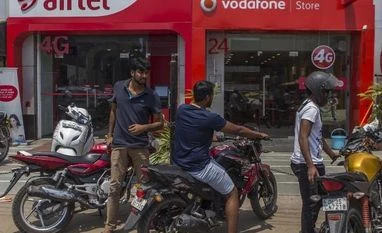The Narendra Modi government is considering setting up a special purpose vehicle (SPV) to reduce the telecom sector’s financial stress, according to a communication sent out by Cellular Operators’ Association of India (COAI) to its member telecom service providers.
Under the Centre’s tentative proposal, the government will stop collecting annual licence fee (LF) and spectrum usage charge (SUC), which will be about Rs 4,83,000 crore over 15 years, from operators. Instead, the operators will give LF and SUC to the SPV for the next 15 years and get equity in lieu of it.
The operators will also pay their old adjusted gross revenue (AGR) dues—recently mandated by the Supreme Court—to the tune of Rs 1,20,000 crore to the SPV in annual instalments. This will also be considered as their contribution towards equity in the SPV.
As part of the deal, the government may give spectrum worth Rs 1,46,700 crore to the SPV free of cost without any auction, according to COAI. This will be considered as the government’s contribution towards equity.
The Centre may also give Right of Way (ROW), which is the right to lay cables on government land for which generally municipalities and state governments charge a fee, worth Rs 1,00,000 crore to the SPV.
Therefore, the government’s total contribution will be to the tune of Rs 2,50,000 crore and the government will get equity in lieu of it.
If created, the SPV will also roll out a common 5G network and all operators will use it.
In an email seeking views of its members, COAI has stated that based on its interaction with senior government officials the industry has “been asked to provide inputs for a proposal to reduce the financial stress for telecom sector”.
Explaining the government proposal, the telecom lobby association states that “the viability of the sector will be ensured by converting the AGR dues into EMIs and by reducing the LF and SUC burden on the sector. The payment of AGR dues and LF & SUC will be treated as equity infusion to the SPV.”
The email says that the SPV would fund the rollout of a common 5G network to reduce capex by avoiding duplication. All operators will have equal and non-discriminatory access to ubiquitous 5G network.
Telecom operators will divide equity among themselves in the ratio of: Airtel (32%), Vodafone Idea (31%), Reliance Jio (31%), BSNL/MTNL (6%).
According to COAI, the industry will immensely benefit from it as it will improve financial viability of companies, operators will have equal access to a common state of the art 5G infrastructure, operators will save on capex required for roll-out of 5G network and all operators will equally benefit from the reduction in LF and SUC burden.
The government, on the other hand, will ultimately benefit as it will collect more tax due to increased economic activities.
However, the proposal raises more questions than answers.
Firstly, can the government give 5G spectrum worth Rs 1,46,700 crore, without any auction, freely to the SPV? In the 2G scam judgement dated February 2, 2012, the Supreme Court made it mandatory that spectrum, which is a scarce resource, would be allocated by the government only through a transparent auction process. This would achieve both fair competition and maximising revenue for the state. If the government gives spectrum without auction, it could be in violation of the Supreme Court’s order.
Secondly, in the absence of an auction, how will the market value of 5G spectrum be determined?
Can Centre waive off LF and SUC?
There are also more questions regarding payment of LF and SUC to an SPV. Presently, both dues go to the Consolidated Fund of India, which is used ostensibly for the welfare of the citizens of the country. Can this be diverted to an SPV then, where private companies have ownership? It will be used for commercial purposes by the operators. When the companies acquired Spectrum, they knew that they will have to pay LF and SUC. How will the government justify waiving off licence fee for the winners? How will the government compensate companies like RCOM and Aircel who had to leave as they couldn’t pay LF and SUC?
Will it block entry of new operators?
Finally, it is unclear how if the government’s proposal is accepted, how a new operator will enter the market? Will it get an unfair deal because old operators didn’t pay AGR dues? Will entry be free for it as 5G spectrum is free, cost of infrastructure is free, it will get free access to infrastructure?
(Manoj Gairola is a senior telecom journalist.)
Unlock 30+ premium stories daily hand-picked by our editors, across devices on browser and app.
Pick your 5 favourite companies, get a daily email with all news updates on them.
Full access to our intuitive epaper - clip, save, share articles from any device; newspaper archives from 2006.
Preferential invites to Business Standard events.
Curated newsletters on markets, personal finance, policy & politics, start-ups, technology, and more.
)